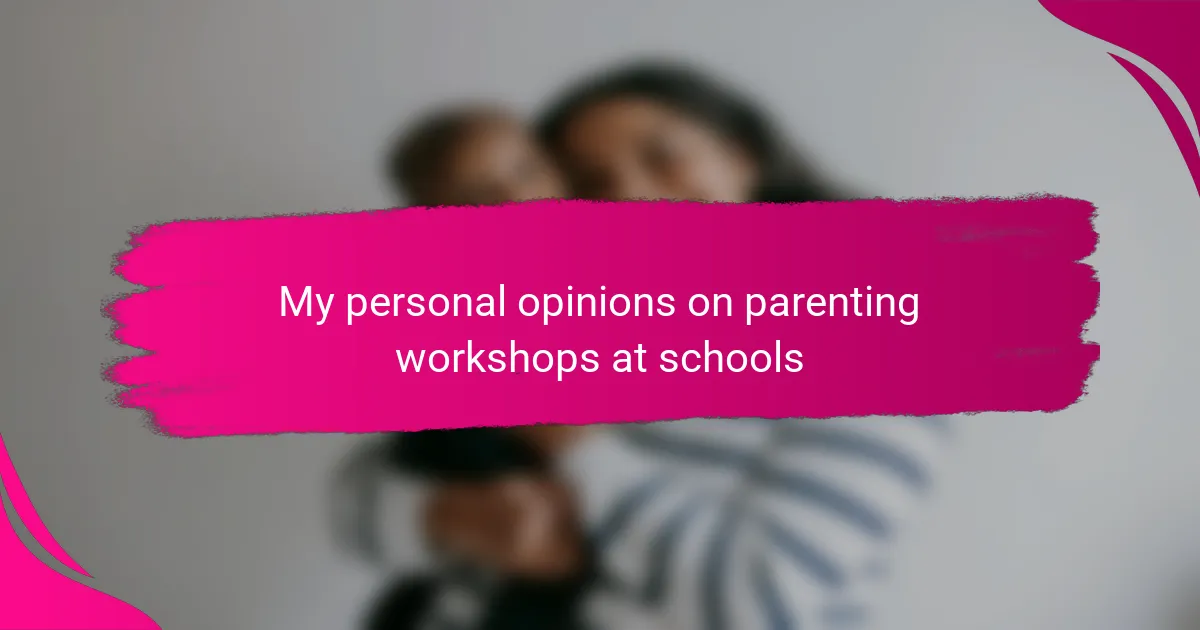Key takeaways
- Parenting workshops provide community support, practical tools, and emotional insights to help parents navigate challenges effectively.
- Common topics include effective communication, behavior management, and emotional regulation, which help enhance parent-child relationships.
- Challenges such as time constraints and the need for inclusivity highlight the importance of adapting workshops to diverse family needs.
- Recommendations for improvement include flexible scheduling, tailored content, and ongoing support to maintain momentum after workshops.
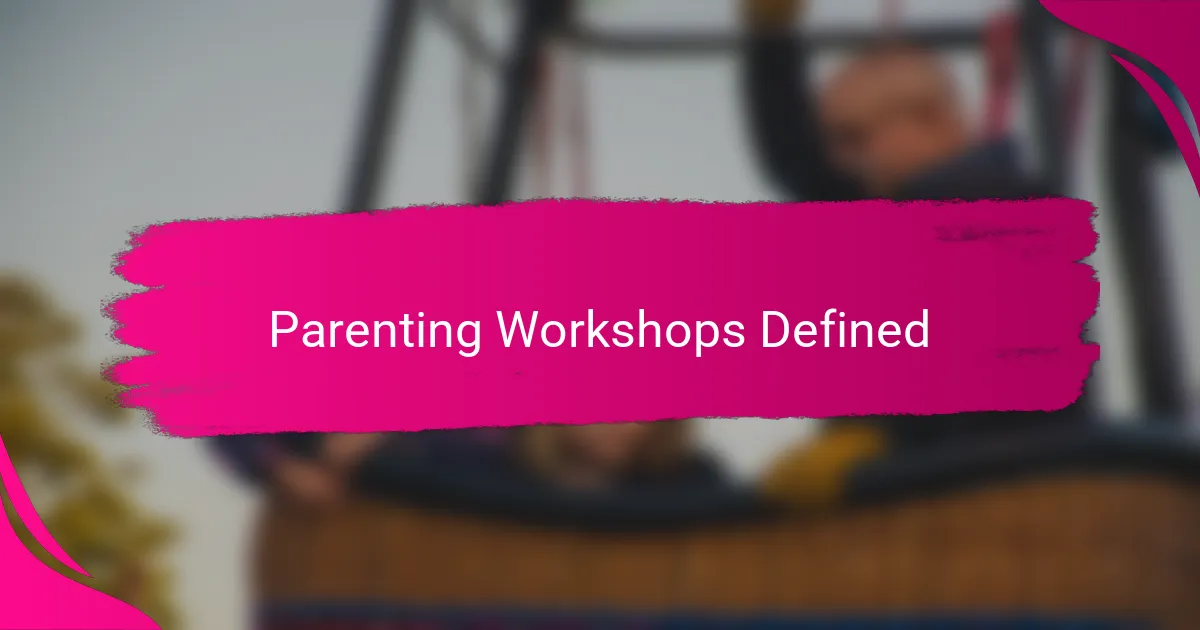
Parenting Workshops Defined
Parenting workshops are sessions designed to offer practical guidance and support to parents, often hosted within school settings. From my experience, these workshops break down complex parenting challenges into understandable strategies, making the whole process feel less overwhelming. Have you ever left a meeting wishing you had clearer answers? That’s exactly the gap these workshops aim to fill.
What strikes me most about parenting workshops is their focus not just on information, but on creating a sense of community among parents. I remember attending one where sharing personal stories turned strangers into allies, which made me feel less alone in the parenting journey. Isn’t it comforting to know there are others navigating the same ups and downs?
Ultimately, parenting workshops serve as more than just a one-way lecture; they are interactive spaces where we can ask questions, express frustrations, and gain insights that textbooks might never cover. I find these moments invaluable because they acknowledge the emotional side of parenting, something often overlooked but deeply felt. Wouldn’t it be great if more schools embraced this approach?
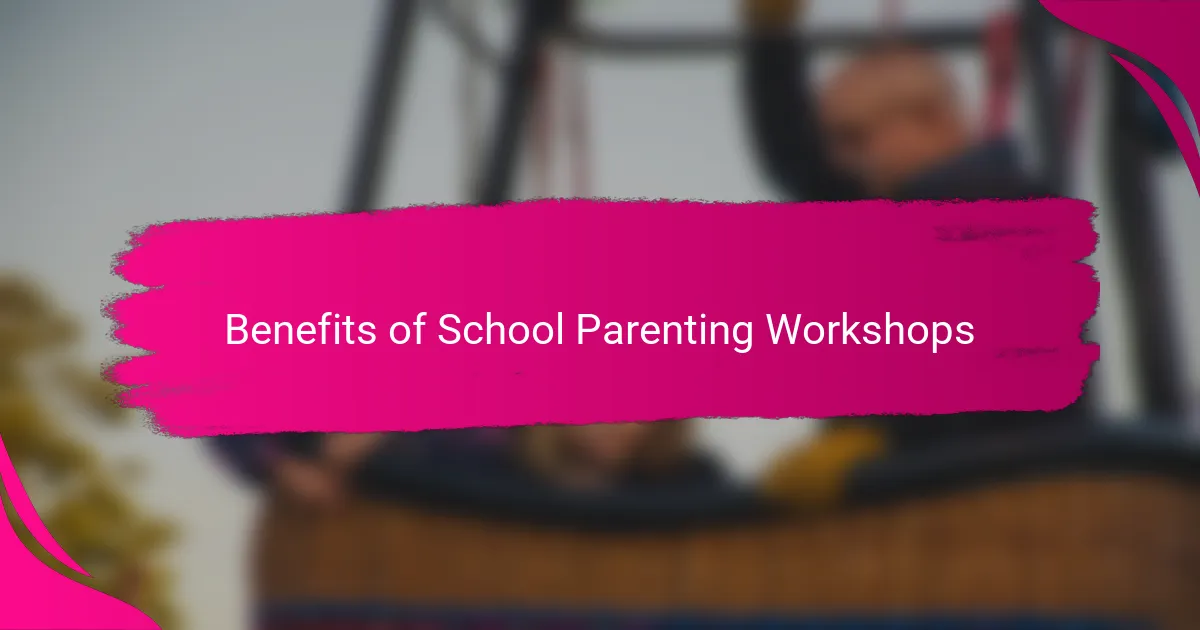
Benefits of School Parenting Workshops
One of the major benefits I’ve noticed in school parenting workshops is how they equip us with practical tools that actually work. Instead of vague advice, I walked away with actionable steps that helped me connect better with my child. Don’t you find it refreshing when guidance feels tailored to real-life situations rather than just theory?
Another thing that stands out is the chance to hear diverse perspectives right there in the room. Listening to other parents’ experiences made me realize I’m not alone in facing challenges like screen-time battles or homework stress. Have you ever found comfort just knowing someone else gets what you’re going through?
Finally, these workshops often boost our confidence as parents. When I left sessions feeling more prepared, it translated into less anxiety at home. It’s incredible how a couple of hours can shift your mindset and leave you ready to handle those frustrating moments with a calm approach. Isn’t that the kind of support every parent needs?

Common Topics Covered
One common topic I’ve seen repeatedly is effective communication with children. It might sound simple, but learning to listen without judgment and express yourself clearly really changes the dynamic at home. Have you noticed how just tweaking the way you talk can lead to fewer conflicts and more understanding?
Another frequently covered area involves managing behaviors and setting boundaries. I recall a workshop where the facilitator shared practical tips on staying consistent without feeling like the “bad cop.” It made me realize that discipline doesn’t have to be harsh to be effective—won’t that make parenting feel a little less stressful?
Emotional regulation is also a big focus in these sessions. Parents are encouraged to recognize their own stress triggers and model calmness for their kids. Reflecting on my own reactions, I found this incredibly helpful—after all, how can we teach patience if we don’t practice it ourselves?
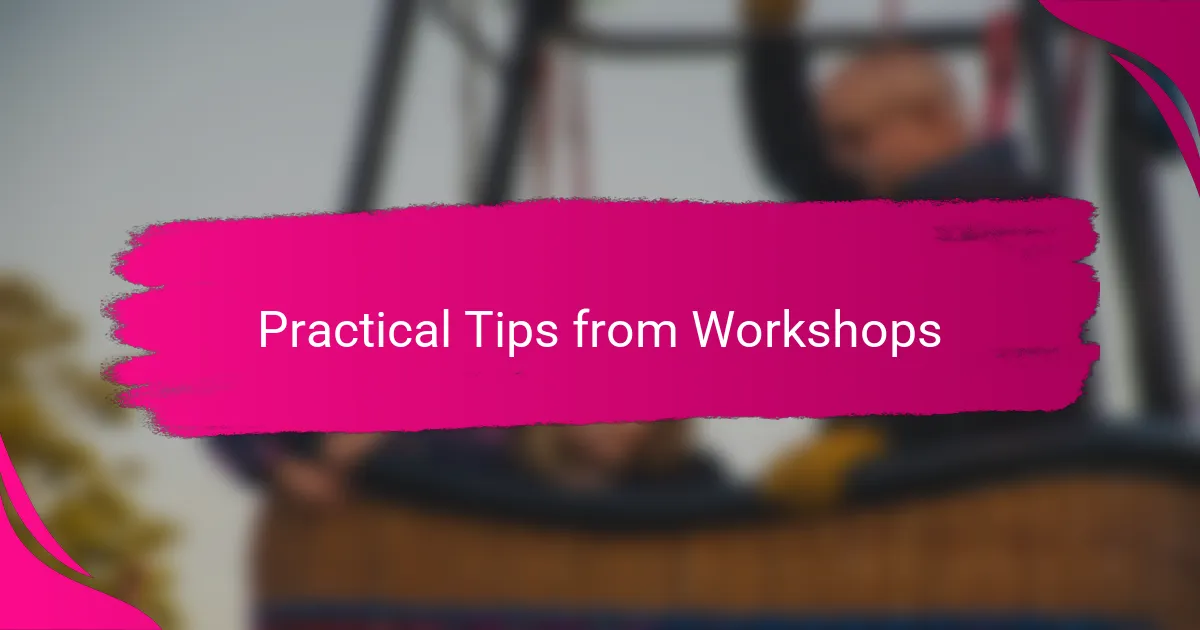
Practical Tips from Workshops
One practical tip that stuck with me from a recent workshop was the value of setting small, clear goals when trying to change a behavior. Instead of aiming for perfection overnight, breaking challenges into manageable steps made me feel more in control—and my child seemed less pressured too. Have you ever tried celebrating tiny wins? It truly shifts the entire experience.
I also found the advice on creating consistent routines incredibly useful. The facilitator shared how predictable daily patterns can provide children with a sense of security, which I hadn’t fully appreciated before. Since applying this tip, our evenings have become smoother, and I feel less frazzled knowing what to expect.
Another nugget I treasure is the emphasis on self-care for parents. It might seem unrelated, but the reminder that we need to recharge before we can effectively support our kids hit home. I started carving out brief moments just for myself, and honestly, it made me a more patient and present parent. Don’t we all need that little reset?

Challenges and Limitations
While I truly appreciate the value of parenting workshops, I’ve noticed that time constraints can make attending them a real challenge for busy parents. Have you ever felt torn between work commitments and wanting to be there for a session that might help you? That tension between schedules can sometimes limit how many parents actually benefit.
Another limitation that comes to mind is that not all workshops address the wide variety of parenting styles and cultural backgrounds. From my experience, a one-size-fits-all approach often leaves some parents feeling overlooked or misunderstood. Doesn’t it raise the question: how can these programs become more inclusive and adaptable to diverse needs?
Lastly, even when workshops provide excellent information, sustaining those positive changes at home can be tough. I’ve seen how enthusiasm after a session can fade quickly without ongoing support or follow-up. Isn’t it frustrating when good intentions fall short simply because of a lack of continuity?

Personal Experiences with Workshops
I remember the first workshop I attended at my child’s school; I was skeptical at first but left feeling surprisingly empowered. The facilitator’s approachable style made it easy to open up about my struggles, and hearing others’ stories reminded me that I wasn’t alone in facing parenting challenges. Have you ever walked out of a room feeling lighter just because someone understood what you’re going through?
In another session, I was struck by how practical and relatable the advice was—far from abstract theories. Applying those tips at home led to noticeable improvements in my child’s behavior, and that success was really motivating. It made me think: why don’t more parents talk openly about what actually works for them?
That said, I’ve also experienced moments where workshops felt rushed or too generic for my family’s unique situation. It left me wishing for more personalized follow-up to help integrate what I’d learned into our daily life. Have you ever wanted to dive deeper but felt the sessions just skimmed the surface? Those are moments when I realize how much more powerful these workshops could be with sustained support.
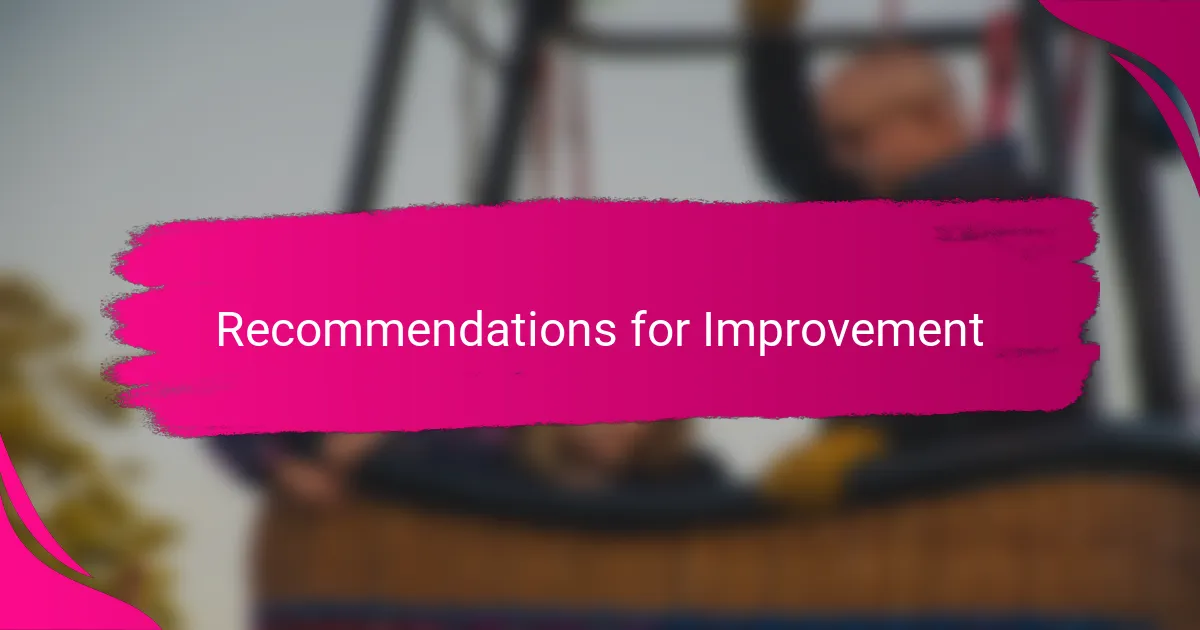
Recommendations for Improvement
One thing I believe could improve these workshops is offering flexible scheduling or even virtual options. I’ve seen how parents juggling work and family commitments sometimes miss out simply because the timing doesn’t fit. Wouldn’t it make sense to meet parents where they are, so no one feels left out?
Another area worth exploring is tailoring content more closely to diverse family backgrounds. In my experience, generic advice can sometimes fall flat when it doesn’t resonate with a family’s unique culture or parenting style. How powerful would it be if workshops acknowledged and celebrated those differences instead of brushing over them?
Finally, ongoing support after the sessions could be a game-changer. I recall feeling motivated right after a workshop but struggled to maintain momentum without check-ins or resources to keep me on track. Could regular follow-ups transform that initial spark into lasting change? From where I stand, it definitely seems like a step in the right direction.
